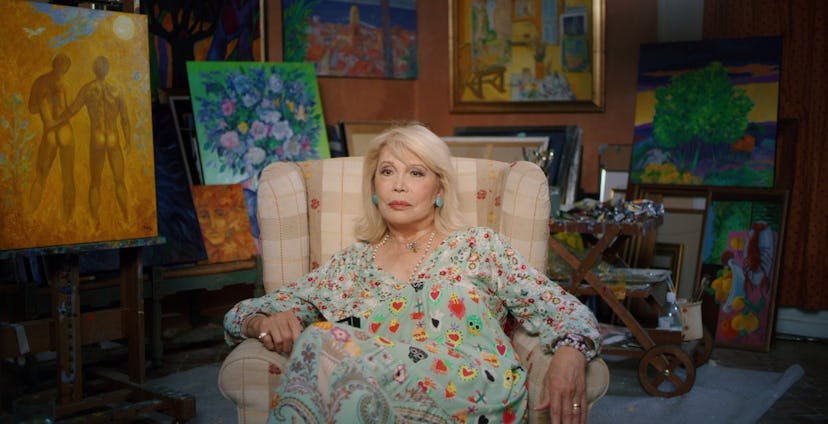Enigma Is a Love Letter to the Women Who Changed Trans History
Director Zackary Drucker on Amanda Lear, April Ashley, and preserving queer legacies.

In her latest documentary, Enigma, director Zackary Drucker turns her lens on two of the most elusive and mythologized figures in queer history: Amanda Lear and April Ashley. Both women—trailblazing trans icons who refused to be pinned down by a single identity—were legends in their own right. Lear—a fashion model for designers like Karl Lagerfeld, Yves Saint Laurent, and Paco Rabanne, muse to artists like Dalí and Bowie, and a successful disco-era chanteuse—made a career of blurring fact and fiction. Ashley, a model, socialite, and one of the first Britons to undergo gender confirmation surgery, became a tabloid sensation in the 1960s after being cruelly outed by the press. Through intimate archival footage and rare interviews, Drucker (whose other recent documentaries Queenmaker and The Stroll chronicle lesser-known moments in trans history) peels back the layers of performance and contradiction that defined each woman’s public life.
“I realized these histories are slipping through our fingers,” Drucker told W ahead of the film’s June 25 release. “There are so few survivors who can illuminate what those bygone decades were like to live through for trans folk.” Enigma is part biography, part act of preservation, and is aligned with Drucker’s larger mission: to humanize trans and gender-nonconforming people on-screen. It was while working as a producer on Transparent that Drucker first understood “that the most relatable renderings of trans life come from humans who are fallible…who are not always forthcoming and direct.” On that note, the film also reveals the fraught relationship between Ashley and Lear; the former was something of a mother or big sister to the latter, a connection that Lear would later vehemently deny. “Amanda’s somebody who keeps you guessing,” Drucker says. “She’s a complicated woman.”
Now streaming on HBO, Enigma features extensive interviews with both women: Lear, now 85; and Ashley, who passed away in 2021 at the age of 86. “I want to document it while I can,” Drucker says, “while these people can still tell their stories.”
How did you find the two subjects for this story?
Amanda Lear is my original archetype. I moved to New York City the day after I graduated high school, and I made a trans friend who was a huge disco fan. She told me about Amanda. When I looked up a photo of her, I couldn’t believe how beautiful she was. I hung this picture up on my wall and very much manifested the woman I am today, in her image or with her as an inspiration. It was the prehistoric age of trans; things were very word-of-mouth back then. Amanda obviously had a huge global impact, and her trail was well-worn. It was possible to look her up in the archives. She was connected to these famous rock stars. There was a rumor that she was the namesake of “Miss Amanda Jones,” the early Rolling Stones hit, and that she inspired David Bowie’s androgyny period.
Amanda Lear with John Lennon and George Harrison
How did you learn about April Ashley?
I came to April Ashley in the 2000s, around the time that her autobiography, The First Lady, was published. She had a renaissance at the end of her life and was hailed as a human rights icon. Especially as the trans movement in the U.S. was gaining momentum, she was somebody that people looked to as a leader in the U.K., which has a parallel history of trans presence in culture. Even the backlash is similar.
April Ashley in 1970
Enigma presents the outcomes of two different paths: with April, it’s a life of disclosure and living publicly, and with Amanda, of staying—for the most part—in the closet. Why were those different narratives important?
These two protagonists encapsulate the two paths that trans people could take in the 20th century. [Amanda’s path] was to obfuscate the details of your origins for the sake of being whoever you want to be. I don’t know if, in 1960, when April told the tabloids exactly who she was, she understood the consequences. That she would for decades live with the reverberation of that honesty. Amanda’s story makes a lot more sense when you observe what April endured. Amanda feels like a very liberated person because she’s not responsible for anyone but herself. Whereas April takes what’s more clearly a noble path, and the example that we follow to this day of pride, of being unashamed of who we are. They experience lives with totally different trajectories. It says so much about today and all the things that have followed.
April Ashley in Enigma
In the film, Amanda is very cagey and coy, pretending not to recognize older photos of herself and denying various aspects of the past. What was it like to interview her?
It was thrilling to interview Amanda. I treated it like climbing Mount Everest. It was only going to happen once, so it felt monumental to me. I wanted to read everything, to have all of her lyrics on hand. Amanda’s history is well-documented, and I knew she would be evasive and slippery. She keeps you on your toes. But I wouldn’t have it any other way.
Amanda Lear in Enigma
How did getting to know these women shift your perspective on queer history?
This is about more than just April and Amanda. It’s about the first generation of transsexual women. I stand on the shoulders of giants, during a time when our community needs it the most. The only way to offset the notion that trans people popped up a decade ago is to foreground these stories from the past. It’s tremendously reinforcing to see this group of women in their 80s, who have seen it all and survived not only gracefully, but spectacularly.